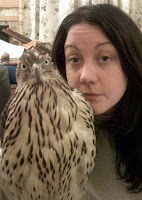This was an impulse buy. Had I given it much thought, I would have left the book in the shop. But I had heard of it on Booktube. The fact that I have no interest in birds, no wish to dig up my feelings of my own father's passing, nor any massive interest in reading a memoir of a woman I had never heard of, didn't quite realise themselves until I got the book home, looked at the cover again, and then realised that I now had to read the damned thing (it cost a fortune). It came as quite the surprise then when I discovered that I really enjoyed it!

One cannot say that this is nature book. Nor is it a literary review, nor is it a book about overcoming bereavement. It is a bit of everything with a side order of some interesting psychology.
“Here’s a word. Bereavement. Or, Bereaved. Bereft. It’s from the Old English bereafian, meaning ‘to deprive of, take away, seize, rob’. Robbed. Seized. It happens to everyone. But you feel it alone. Shocking loss isn’t to be shared, no matter how hard you try.”
― Helen Macdonald, H Is for Hawk
There were parts that really spoke to me. Especially when it came to her struggles with Mable (the hawk). How she internalised the problem and found fault with herself instead of looking at the more practical aspects of all that could be wrong. I know I do that too, and seeing her realise that made me more aware of the times I blame myself for things going wrong when they are completely out of my control.

I did find it difficult empathising with her for her grief over her dad. I too have lost my dad (4 years ago), and although I was also a daddy's girl, I didn't lose complete grip on myself and my identity - and definitely not my humanity. But then I don't have other issues and I had to be the support so I wasn't afforded the luxury of coming apart completely. I was sad for her though.
Mabel was brilliantly depicted. I felt she was alive and could so easily visualise her ducking and weaving and crouching and bating. Yes, I learnt more words reading this too. I don't know if I will ever need to talk about hawkish actions in the right terminology, but it is nice knowing that I could.

This book also spends a lot of time discussing T.H. White's book,
The Goshawk. In the beginning, I found this commentary very interesting, especially as she was telling us about White, in preparation for the process he took with his own Goshawk, Gos. Unfortunately, I will have to say I ended up skim reading a lot of this towards the end. I felt disturbed more than anything else, as to how White treated his hawk.
Helen does write well, and her knowledge extends far beyond that for hawking. I liked the lyrical style she used. And just to say it again, she must have loved Mabel a lot, because she captured the hawk and her gestures so well on the page.
I gave this 4 stars on Goodreads.
 North is a circus girl, who lives on a circus boat, and who performs with a bear. She is required to marry a young man she doesn't even like. Callanish is a girl with secrets who is left repenting for something as a Gracekeeper, a water-world version of an undertaker. She was originally from the land. This book covers their lives.
North is a circus girl, who lives on a circus boat, and who performs with a bear. She is required to marry a young man she doesn't even like. Callanish is a girl with secrets who is left repenting for something as a Gracekeeper, a water-world version of an undertaker. She was originally from the land. This book covers their lives.




